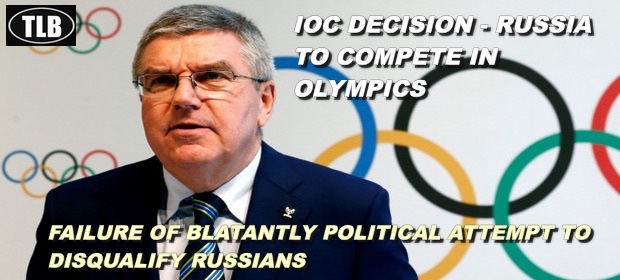
By Alec Luhn in Moscow
The International Olympic Committee’s decision not to ban Russia from the Rio Games was met here with relief and jubilation but also lingering anger over state-sponsored doping allegations that are viewed as a political attack on the country.
The IOC said that rather than an across-the-board ban, the 28 federations that govern summer Olympic sports would review Russian athletes’ records and decide who can compete in Rio next month.
“We’re grateful to the IOC for allowing Russian athletes into the Olympics in Rio de Janeiro,” the sports minister, Vitaly Mutko, told the state news agency, Tass.
But speaking to the Rossiya 24 television channel Mutko complained about the committee’s decision to ban those Russian athletes who have tested positive for performance-enhancing substances “even though we know dozens of athletes from well-known countries who will compete at Rio with just such a history”.
The measure will rule out the swimmer Yuliya Yefimova, who won a bronze medal at the 2012 London Olympics and tested positive for meldonium this year, as well as the doping whistleblower, Yuliya Stepanova. Russia has announced a team of 387 athletes for the Games but already that number has been reduced after the court of arbitration for sport ruled on Thursday against allowing 68 Russian track and field athletes to compete. The US-based long jumper Darya Klishina will likely be the only Russian track and field athlete in Rio.
The head of the Russian Olympic Committee, Alexander Zhukov, called the IOC announcement a “compromise decision” made under “colossal pressure”. He said that rather than enjoying the presumption of innocence Russian athletes will now have to prove they are clean.
“Obviously that contradicts world legal norms but, even based on this, the majority of athletes meet criteria,” Zhukov said.
The world champion modern pentathlete Alexander Lesun said the decision was “not a victory, it’s even a little loss”. He argued that the doping findings against Russia were “nonsense and groundless accusations” and that the calls to ban the whole team were political.
“A harsh attack is going on and it’s not a fair attack,” Lesun said. “Doping is in all countries and there are violators everywhere. Why should we be singled out?”
“Thank god the grown-ups at the IOC made this decision and didn’t collapse under pressure from the newspapers and everyone else,” he said.
Media coverage of the decision was nearly euphoric at points. “We’re going to the Olympics! There is no total ban on our team, I congratulate all of you!” Ilya Trifanov, correspondent for the state channel Match TV, told viewers from Lausanne.
At the same time the suspension of Russian track and field athletes over doping remains a bone of contention. The world anti-doping agency’s findings of widespread performance-enhancing substance use, directed by the government, have been widely derided here as a Western smear campaign. Some suggested these were part of an orchestrated plot to eliminate a major rival in the chase for Olympic medals.
Match TV ran a list of US athletes who had been disqualified for doping since the 1970s, arguing that the Americans were the puppet masters of the Russian drug scandal. The former world champion triple-jumper Yolanda Chen called it a “small victory” that Russian athletes would be at the Olympics even though the decision-making “process was all political”.

“The main thing they wanted was so our flag wouldn’t be there but it’s there and our athletes won’t have to compete under any other flag,” she said.
The Olympic gold medal-winning gymnast, Svetlana Khorkina, cautioned Russian athletes that more “traps will probably be laid” for them in Rio. The publication of the lawyer Richard McLaren’s Wada report of state-directed doping on Monday did not give Russia enough time to contest the allegations, she said. “Everything was done very exactly, they didn’t give time to contest this,”Khorkina told the state channel Rossiya 24. “We need to give credit to our opponents, our enemies.”
The legendary Greco-Roman wrestler Alexander Karelin, who will reportedly be a member of the special anti-doping commission announced by Vladimir Putin on Friday, said the IOC had made the “most elegant decision amid the clamour, tendentiousness, unprecedented pressure, desire of some national Olympic committees to remove an obvious contender for Olympic medals from the race by any means”.
Only 12 days remain before the start of the Rio Games, leaving many to wonder how the federations will be able to vet Russian athletes in time. Lesun said he did not yet know how that process would be carried out but the modern pentathlon team was not slated to leave for Rio until mid-August.
Although he was excited to go, he said the absence of Russian track and field will tarnish the Olympics.
“Can you imagine the happiness of other athletes who couldn’t come near to us before?” Lesun said. “How can a country win and consider itself a full Olympic champion now? They’re weak countries and weak athletes. You need strong competition for it to count.”
************
ER recommends other articles by the Guardian

